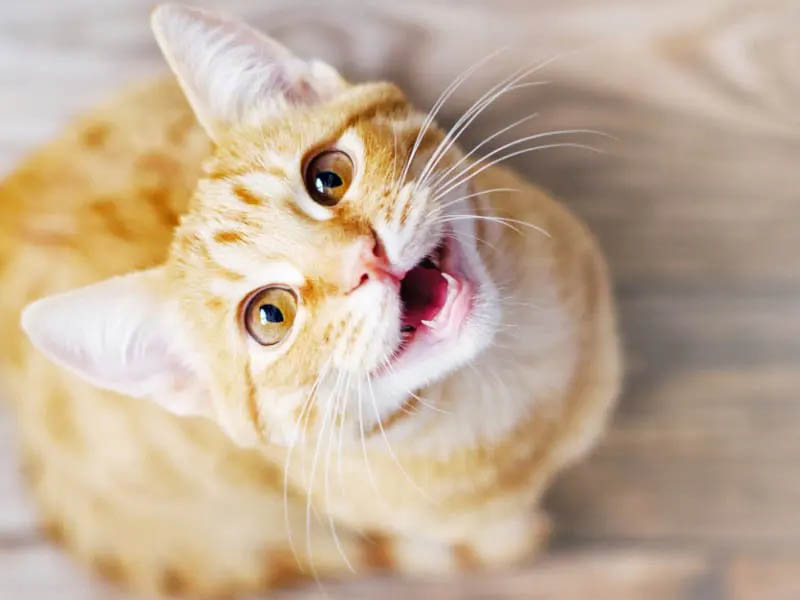
Why Is My Cat Meowing So Much: 9 Common Reasons for Excessive Meowing
This post may include affiliate links. Please read my disclosure policy.
A while back, my cat, Olivia, started meowing excessively for no apparent reason. When she would meow, it sounded like she was in a bit of distress. But when I approached her, she acted normal and friendly.
If your cat is meowing excessively, this article will help you decode your cat’s meow and figure out what they’re really trying to tell you.
What Is Excessive Vocalization?
Excessive meowing in your cats refers to a behavior where a cat meows more frequently or loudly than what is considered typical for them. Excessive cat meowing can be characterized by persistent and intense meowing throughout the day or night, often accompanied by other signs like restlessness, pacing, or attention-seeking behavior.
Why Your Cat Won’t Stop Meowing
I consulted The Catvocate, Veterinarian Dr. Liz Bales, who is an expert on cat behavior. And what she told me was gold!
She told me that there isn’t one single reason for a cat’s excessive vocalization. In fact, there could be many reasons. The good news is, once you understand your cat, you figure out just what they need and why they’re meowing so much.
There are nine common reasons why cats meow excessively. Most are benign, but some will need to be addressed by a professional.
Your cat may meow a lot because they:
- Are greeting you
- Feel lonely
- Want to mate
- Are hungry or thirsty
- Feeling sick
- Want attention
- Have impaired cognition (common in senior cats)
- Are bored
- Are stressed or anxious (e.g., they have no direct access to a clean litter box)
In order to figure out which reason is behind your cat’s meow, we need to understand their behavior a bit better. Then, we’ll dive into some dos and don’ts about reacting to your cat’s cries.
1. They’re Greeting You
Your cat might just be trying to say “hello.”
After you’ve been away, it’s not unusual for your kitty to run and greet you at the front door and give you a sweet meow. She may also be inclined to greet new visitors.
This greeting may be lengthy and is likely just your cat’s way of telling you how much they missed you.
Watch my full interview with Dr. Bales below.
2. Your Cat is Lonely
Despite cats’ reputation for being loners, they actually do get lonely.
In a recent survey, nearly one out of ten cat parents reported their cats showing signs of separation anxiety when their owners leave the house.
And if you’re home but not spending time with your cat, meowing a lot may be their way of expressing their loneliness.
Try spending some time with your cat, grooming them, cuddling, or talking to them for 20 minutes two times a day. You may notice your cat becomes less vocal after doing this regularly.
3. They Want to Mate
Unspayed or unneutered male and female cats that meow excessively at night may be their way of attracting a mate.
Unspayed female cats make a very specific yowling meow when they are in heat. A male cat can also hear these specific yowls and even smell a female in heat, resulting in excessive meowing. Spaying or neutering them will end this behavior.
If this is the case, your cat’s behavior is perfectly normal. You’ll likely notice it stops once your female or male cat is spayed or neutered.
There are many health benefits associated with “fixing” your feline, not to mention that your kitty won’t be contributing to pet overpopulation!
4. Their Needs Aren’t Being Met
Your cat’s excessive meowing may mean you need to check their food and water supply, similar to how kittens meow when they’re hungry, thirsty, or cold. Is there food and water available, and if so, are they eating and drinking it?
If your cat is rubbing against your leg when you walk by their dish, chances are, they want you to fill it up.
However, if your cat isn’t touching their food and water, there may be a couple of reasons why.
Your cat may simply not like the food, or they may have a medical issue that’s causing them to lose their appetite. If this is the case, of course it’s best to visit your veterinarian to rule out any health issues. Cats also frequently develop a skin allergy to some plastics, so use a ceramic or glass feeding bowl.
If they’re not drinking their water, they may be thirsty, but perhaps experiencing “whisker fatigue.”
Since cats use their whiskers to sense much of their world, they’re very sensitive. Repeated contact with the edge of their bowl may cause irritation to their whiskers, causing them not to eat or drink, even when they’re thirsty or hungry.
If this is the case, try using a fountain, like the one shown later in this article.
Also ensure your feline friend’s litter box is kept relatively clean. No one likes a clogged-up or full toilet, so neither will your cat. Check if their litter box is still accessible to them as well.
On the topic of litter boxes, ensure you have at least one litter box per feline family member, plus one extra. For finicky cats, make sure it is large enough for them to get fully inside and be able to turn around. Having multiple locations for boxes is also important if you have more than one kitty.
5. They’re Sick
She could be meowing because something is truly wrong. As our cats age, they often develop health issues, so she may have pain or she could be confused.
Dr. Liz Bales says hyperthyroidism can also be a culprit. She says,
“Cats who become hyperthyroid meow a lot, particularly overnight. Hyperthyroidism is a disease most commonly seen in cats over 8 years old.”
If you can’t figure out why your cat is meowing, your cat seems ill, or her meowing is excessive, it’s important to have a talk with your veterinarian to rule out any underlying conditions.
6. They Want Attention
If your cat comes up to you, rubs against your leg, and meows or purrs, you can bet that she is just seeking some attention.
This is a bit different from loneliness. They may crave attention even if you’ve been around to give it to them. They might simply want to share experiences with you, like looking out the window or playing.
Cats love interactions with their family, so it’s important that we show them how much we care for them by giving them that attention.
7. Their Cognition is Impaired
As felines age, they may develop cognitive issues, just like humans often do.
Their excessive meows may be out of boredom, confusion, anxiety, or habit.
If your senior cat is meowing excessively, it’s best to visit your veterinarian to rule out anything serious as well as to learn how to make them comfortable in their precious senior years.
8. They’re Bored
As any parent of a toddler knows, boredom can lead to some less-than-desirable behavior. It’s really no different with cats!
Especially if your cat is the only feline in the home (like my Olivia was for some time), she may become restless and look for a way to be entertained.
Just because cats are rather independent creatures doesn’t mean they don’t need mental and physical stimulation in their environment.
Feline enrichment is a hot topic these days because so many house cats are overweight or obese (about 50%!) since they don’t get enough exercise or opportunities to use their natural instincts.
Keep reading below for some advice and product solutions on enriching your cat’s environment.
9. They’re Stressed or Anxious
Excessive vocalization is one symptom of cat anxiety.
Meeting new people, losing family members (fur or human), or loud noises can all cause your cat to become stressed.
Change in their environment, even as subtle as closing once-opened doors, can cause your cat stress.
When stress is prolonged, your cat may develop anxiety. This anxiety can make your cat meow louder or more frequently than normal.
See this resource page for more help on dealing with pet anxiety.
What Does My Cat Mean When They Speak?
Pet parents are often cognizant of their kitty’s various meows, but when they start making excessively loud or even soft constant meows that’s uncharacteristic of them, along with any unnatural body language or other cues, it’s helpful to know what their meowing may mean.
| Meow Type | Meaning |
| Short meow | General greeting or acknowledgment. |
| Prolonged meow | Request for attention or interaction. |
| Multiple meows | Excitement or anticipation. |
| Chirping meow | Expression of curiosity or interest in something. |
| Trills | Friendly greeting, often used between cats or humans. |
| Loud, low-pitched meows | Discomfort, pain, or distress signal. |
| High-pitched meows | Frustration, annoyance, or impatience. |
| Rumbling meows | Contentment, often heard during kneading or cuddling. |
| Yowls | Indication of stress, mating behavior, or territorial disputes. |
| Hisses or growling meows | Aggression or warning. |
Now that you’ve figured out why your cat meows so much, it’s time to do something about it!
Dos and Don’ts of Dealing with a Cat that Doesn’t Stop Meowing
- Don’t ignore your cats meowing without establishing the reason. Remember, there’s something causing her to be vocal. Even if you think your cat might just be meowing only because of boredom or to gain attention, make your best attempt to establish the reason.
- Do find a source of entertainment for your cat. Your cat needs to play and keep busy. Adopting another cat to keep your current kitty company is an option for some. However, if that’s not an option, or you already have multiple cats, try out some new kitty products to keep her entertained. My cat, Olivia, loved keeping busy with this Cat Activity Play Mat. If you decide to get a second cat, introduce them slowly to avoid other unwanted behaviors, such as fighting or inappropriate urination.
- Don’t punish your cat for meowing. Punishing your cat for meowing isn’t kind or effective. Dr. Liz Bales advises to never hit your cat, yell at your cat, or spray her with water. These techniques don’t work and will make your cat scared of you. Getting to the root of the problem is always the best course of action.
- Do talk to your veterinarian. If you can’t figure out what your cat needs or wants, it’s time to have a conversation with your veterinarian. Your kitty may have a health concern that needs to be addressed. Don’t put this off — cats are great at hiding illness, so if you so much as have a hint of suspicion there’s a health issue, see the vet.
- Don’t reward bad behavior. If it’s excessive attention that your cat is seeking, don’t give in to her every want. Dr. Bales says, “If you know your cat is healthy and safe, their needs are met, and your cat is meowing for something you don’t want to give – like endless treats – don’t give in. If you give in, you have told your cat that endless meowing works and they will just keep doing it.” Rather, focus on good behavior. Reward her with attention when she’s been calm and quiet. Your kitty will catch on to what you respond to.
“If you know your cat is healthy and safe, their needs are met, and your cat is meowing for something you don’t want to give – like endless treats – don’t give in. If you give in, you have told your cat that endless meowing works and they will just keep doing it.”
~ Dr. Liz Bales, “Catvocate”
- Do make sure your kitty has a smart setup for feeding time. If you want to provide a mentally and physically stimulating meal time (healthiest for your cat), you can use Doc & Phoebe’s Indoor Hunting Cat Feeder. Make your cat work for her food! For her, it won’t be work, it will be more like play because her natural instincts to hunt, pounce, and play will engage! You also need to ensure your kitty has enough water and feels encouraged to drink.
Dehydration can cause health issues in kitties, which may also cause excessive meowing. This Catit Flower Fountain was Turtle’s favorite.
There are some real primal reasons that most pets enjoy drinking from running water and “hunting” for their food, even if it seems weird to us humans.
Plus, water fountains alleviate whisker fatigue, mentioned earlier.
FAQs About Cats Meowing
Why Is My Cat Meowing Differently?
A kitty’s meow might sound different for various reasons, but according to PetMD, a common one is an upper respiratory infection, similar to a cold, which can give them a hoarse voice. Other potential causes for a change in meow include laryngitis, laryngeal paralysis, dental disease, or even tumors. It’s also possible that environmental factors or stress are altering your cat’s vocalizations.
If the meow’s pitch has changed, it could indicate an emotional state; a low pitch may suggest your cat is unhappy or stressed, while a high pitch could point to pain or try to gain your attention. Make sure to monitor for any other signs of illness and consult a veterinarian to identify the cause and get appropriate treatment.
Why Is My Cat Always Hungry and Meowing?
According to PetMD, a cat that’s always hungry and frequently meowing may be exhibiting signs of hyperthyroidism, like aging cats or kitties who are experiencing weight loss. Hyperthyroidism often occurs alongside other health issues like hypertension or kidney disease. It’s important for cats displaying these symptoms to undergo a veterinary exam and possibly lab tests to check their thyroid function.
Other potential medical reasons for a cat’s increased hunger and the frequency of cats’ meow include conditions like diabetes and parasitic infections. Behavioral factors, such as boredom and anxiety, can also result in cats meowing excessively. Make sure to tailor your cat’s diet to their specific life stage and health requirements. If you notice a sudden change in the way your cat meows or even their eating habits, seek your veterinarian’s opinion.
Why Is My Cat Meowing Only at Night?
Cats meowing at night might do so for various reasons, ranging from natural nocturnal activity to seeking attention, boredom, or hunger. Health issues, as mentioned, such as hyperthyroidism, hypertension, kidney disease, or cognitive dysfunction in older cats, can also cause constant meowing. It’s possible that the quiet of the night makes a cat’s meows more noticeable to their human companions.
To address your kitty’s nocturnal chorus, maintain a consistent routine and ensure your cat’s needs for play and affection are met to help reduce stress and anxiety that may cause meowing. A veterinary check-up can rule out any underlying health issues while keeping your cat active during the day and providing a comfortable sleeping area can help minimize nighttime meowing.
The Tail End
Above all, we want our pets to be healthy and happy. Taking the time to address concerns with our pets will lengthen and add joy to their lives. Certainly, that’s something we all want for our beloved animals!


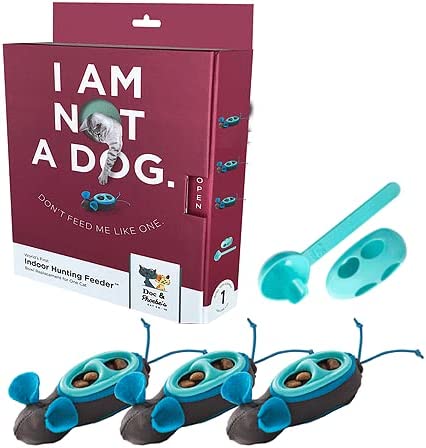

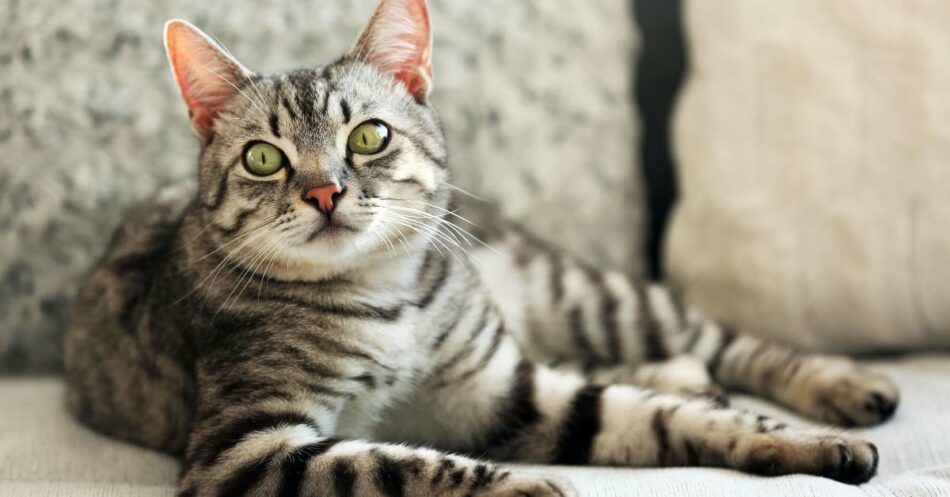
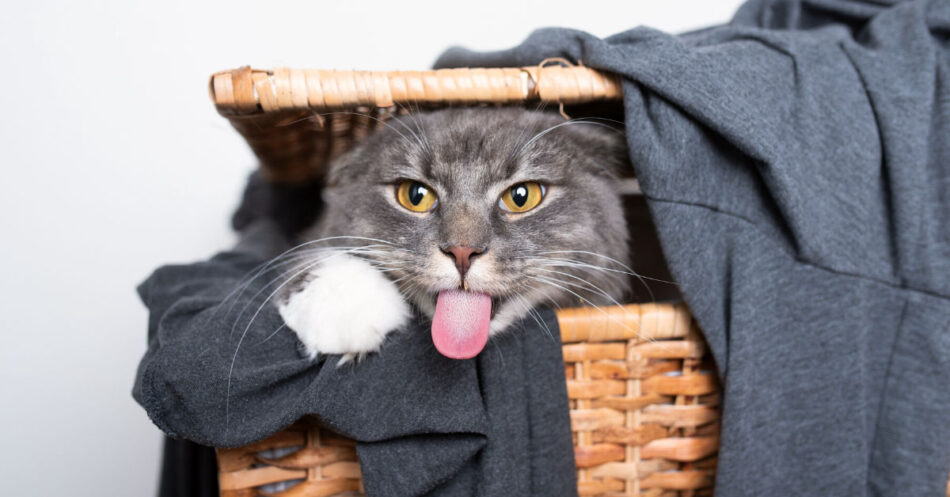
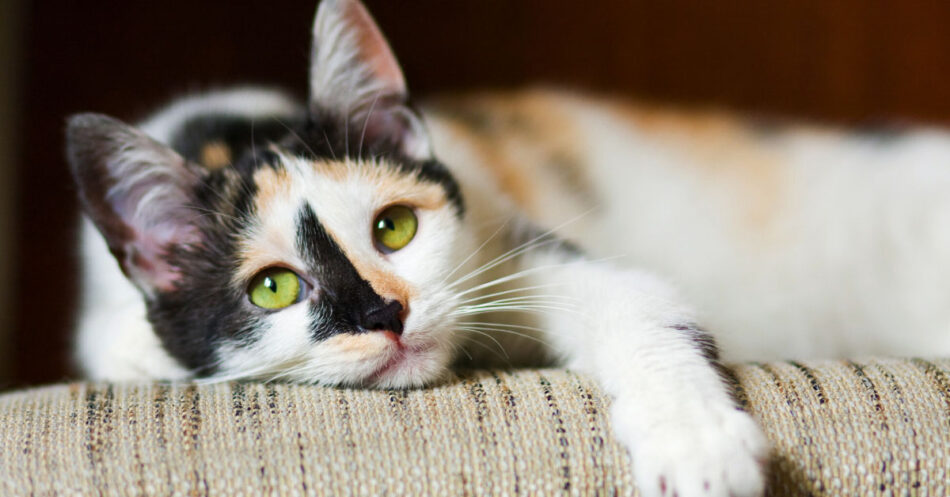
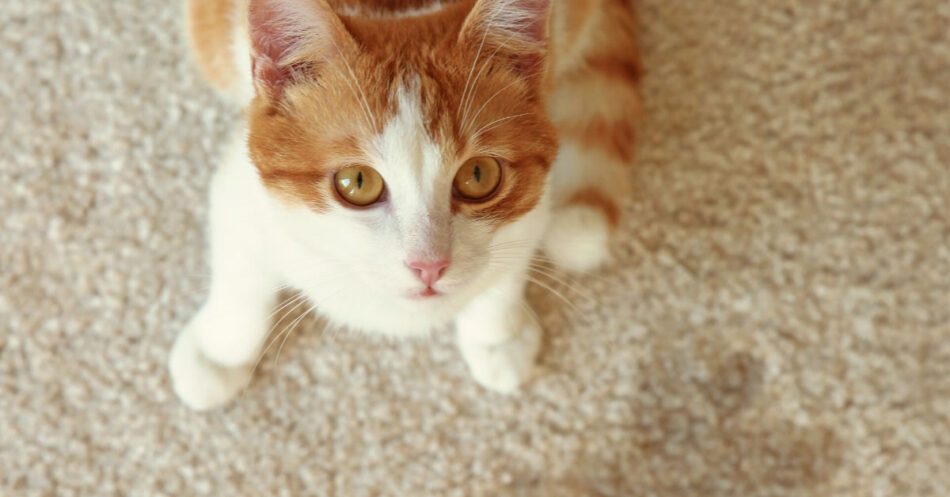
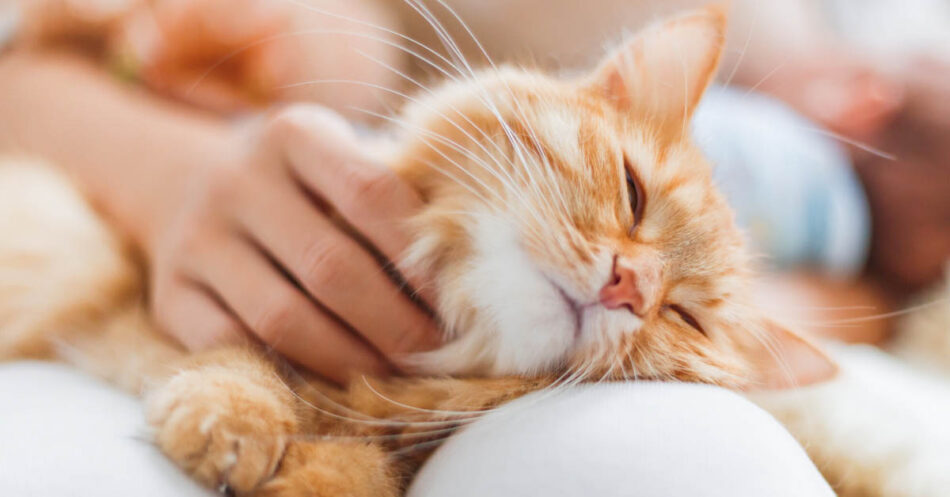
My kitten has just gotten adopted and her sister is getting a weird thing that happening to her she is more playful like she is trying to forget about her sister leaving she is being mean well she is playing with my pants and my shirt She seems to be purring but she seems more comfortable so I don’t get that she is also meowing a lot more then she was before her sister left do you think it’s health thing or just bc her sis left
Hi Isabel,
It sounds like she’s replaced her sister with you, LOL. She’s probably just adjusting to her sister “leaving the nest” so-to-speak. What she’s doing with your pants and shirt, being mean and meowing is probably just her way of playing. She doesn’t yet know how to play with a human:) If the behavior persists for several weeks, you should talk to your veterinarian about it. But I think she’s just transitioning. Good luck! Meow for now. LOL.
We adopted a kitten and she won’t stop meowing. She’s ok when one of us is with her talking or playing with her, but when we have to leave or it’s bedtime, she gets really talkative and almost distressed. She’ll claw her way under a door to get a room she wants into. She’ll sleep just fine so long as we’re in the room, but it’ll take her a long while to be able to calm down and sleep if we leave. I feel bad when she cries, but I don’t know what to do when I have to go to work or bed 😢
Oh my! That’s definitely frustrating!
It’s actually normal for cats to become for active (playing, meowing, etc.) because they are nocturnal. Just before you go to bed, try hiding small amounts of food or treats around your home (away from the bedroom where you’re trying to sleep). This will allow her to “hunt” while you sleep.
You can hide food in little cups or in a special hunting feeder like this one
You might also find this video that I did recently with feline expert, Dr. Liz Bales.
I hope this is helpful!
Kristen
We have been fostering a female cat around 3 to 4 years old for the past 5 months. As we’ve been working from home since April, she’s been driving us crazy ever since with her endless meowing. All her needs are met (clean litter, fresh water, healthy food and snacks, playtime of about 1h per day and walks with the leash outside the condo, lots of attention and also the vet said she’s healthy too). Only when she sleeps we can catch our breath. We’ve also got a camera to monitor her when we’re outdoors and she doesn’t meow when we’re out. She’s also spayed and a single household cat( tried fostering another cat but it didn’t work out). Please help!
Hi Anaid!
Gosh, that’s really frustrating, I’m sure. Have you taken her to the vet to see if there’s a medical problem? You mention that the vet said she’s healthy, but that might have been related to a general check up. If you haven’t discussed this behavior with a vet, I’d suggest doing that.
Also, she sounds like she wants more attention. Have you tried getting her some or puzzle feeders? I recommend some in this blog post above.
Keep me posted! And thanks for being a foster angel:)
Kristen
The more I am home the more annoyed I am that my cat meows excessively. I didnt know until now to not punish him as I have been by squirting water the last two days which doesnt do anything more that risk to damage our relationship. I promised myself I will stop squirting him and I hope I havent damaged our relationship after three days of squirting. He seems to still love me. I dont know what to do. The reasons for the excessive meow seem to be from wanting more attention to loneliness and sometime bordem .I will have his thyroid and health checked. I will leave t he house if I have to in order to maintain my sanity and try ignoring him until he stops. HELP? Please advise and thank you very much Laird
Laird,
Oh my! This issue can definitely be frustrating especially when we don’t know why it is happening! My first suggestion is to take him to the vet and express your concerns. There may be a medical reason behind the meowing.
If your vet says that he is healthy, you could be right, he may just want attention or feel bored. To help with this, you could set aside playtime for him each day. That will give him the attention he desires and keep him occupied. Additionally, you could try leaving treats or food around the house so that he can “hunt” throughout the day. I like using these feeders for my cat.
You also might find this interview I did with Dr. Liz Bales helpful. She is a cat behavior expert and has some great suggestions for keeping our kitties happy and healthy!
I am sorry this issue is so challenging! I hope this helps. Please keep me posted!
Kristen
Our male kitten meows non stop. And I mean non stop. Barely a breath between meowing. He plays with our other cat, he’s well fed and watered and I’ve brought up my concerns to the vet twice and they insist he’s healthy and so he must ‘just be a vocal cat’. But this seems far more than just being vocal; it’s driving me insane as I’m working from home and unless he is asleep, he is meowing!!! It’s like being around a human who doesn’t stop talking unless they’re asleep; thag isn’t being a vocal person it would be seen as bordering on mental illness! I can’t get a single moments rest. I feel like a new mother. I love him so much and he can be very sweet but I don’t know how much more I can take. I have things to do and I can’t give him my undevided attention 24/7. Even when I try to ignore him he will not stop. Our other cat is nothing like this and is very normal. Please please help!
Hi Lydia,
I know you said he plays with your other cat, but have you tried leaving toys around for him to play with? You might also have to just lock him out of your office space (earbuds possibly?) until he wears himself out.
Hi Lydia,
That is definitely frustrating, especially when you are trying to work and do other things! If you vet says that he is healthy, the excessive meowing is likely him wanting attention or boredom.
You could try hiding small amounts of food or treats around your home. That way he can “hunt” and stay occupied while you are working. I use this feeder for my cat and it keeps her occupied!
I also recommend trying a pheromone diffuser. Cats release pheromones into the air as a way of communicating with one another. This diffuser mimics “happy” pheromone messages to keep your cat feeling calm.
Regular playtime is also important. Try leaving toys out for him or setting aside time each day to play with him. This can help your kitty to feel a little more tired and less bored!
I hope this helps! I know this issue is challenging and frustrating! Keep me posted.
Kristen
My cat has been constantly meowing for weeks. There will be times when she is fine, then there are times when she just wont stop no matter what. She started to scratch more than usual but she doesn’t have fleas or any skin problems, she then has been licking her feet a lot move too. I try to play with her but she is not interested just a constant meowing, she has plenty of food and water out and always a fresh clean litter box every day. I don’t know what is wrong and its really starting to worry me. I normally know what is wrong with her but this time I have no idea.
Hi Erica,
It sounds to me like she could have developed some kind of allergy. When our cats are trying to tell us something, the only way they know how is by meowing to get our attention! It could be that she is itchy on her skin, and is trying to tell you. My best advice would be to take her to the vet and get her checked out. This could be something newly developed that is irritating her skin, which is why she just recently began itching more.
Keep me posted!
Kristen
Hi,
So I recently got a kitten from a family friend and he seems to meow a lot. He has clean water, I feed him, he has a clean litter box but continues to meow. I’m getting concerned and really need some advice. I’m new to being a cat mom so any tips help 🥺🥺
Hi Annsly,
Some kittens are more vocal than others. Also note that cats like to be in control of their environment. Since your kitty recently changed homes, he may just be adjusting to his new normal! If you are concerned with this behavior, it is best to contact your vet to see what could be the cause. Additionally, try Feliway diffusers. Feliway releases natural “happy messages” into the air to comfort our cats. I have had a lot of success with it in the past!
Kristen
Hi, I have a male neutered cat almost 6 months old who only stops yowling when he is asleep. I’ve taken him to the vets for a check-up and she told me she ‘thinks’ he is fine (though she didn’t check thoroughly cos he was hissing at her apparently, not a good vet if you ask me but that’s how it went), so I’m at a loss as to what my cat wants. He has everything he needs (food out all the time, fresh water, clean litter, toys everywhere, cat tree, scratching posts etc, we tried to introduce him to a new kitten in case he was lonely but he hated the kitten so had to rehome it), he just walks around the house yowling like he is distressed and nothing seems to stop him until he falls asleep. I really don’t know what to do, I can’t live with his yowling for hours every single day, it’s driving me mad and I’m starting to lose my temper which I don’t want to happen 🙁 what do you think could be behind his yowling? Should I take him back to the vet and risk wasting yet more money on a check-up that might not even be thorough? I’m at my wits end here 🙁
Hi Emily,
I’m sorry to hear you’re cat is so vocal!
Have you tried buying him some of the activity toys or food puzzles mentioned in the blog post above? I ask because those activities would work his brain and body and would hopefully tire him out.
I would also consider going to another veterinarian, but one who specializes in cats only. Sometimes those vets have more experience with feline behavior problems.
Keep me posted! I think there’s hope!
Kristen
I have the same exact concern with my Trixie, Please keep us posted Emily. Thank you
The tattered work glasses speak of the many hours of hard labour he endured during his entire life span.
Hi There! I only have one cat, and he’s fantastic, the vets love to see him, etc. However, since I’ve been dating my girlfriend (6 months), he’s started incessantly crying very early in the morning without fail when she stays over. He usually sleeps next to my head on the bed, but he doesn’t when she’s here, and so he wakes up early and cries and cries. The vet says he’s healthy and all — I’ve even tried non-opioid sedatives as prescribed by the vet. I love him, but I gotta figure this out, any suggestions would be so appreciated. Thank you!
Hi Mike,
This sounds like he could be meowing due to a change in his routine. Since he usually sleeps with you, and now sometimes he can’t, he is likely feeling a little stressed by the disruption to his routine. He could just need some time to adjust to the new change. He is likely meowing at you in the mornings to get your attention. I would recommend putting Feliway diffusers in the bedroom as they release natural, calming pheromones to your cat. This can get him to feel more calm in that room. Another option might be CBD oil when she comes over. I love this from The Anxious Pet!
I hope this helps!
Kristen
Thank you so very much, Kristen! I will give this/these a shot, and get back to let you know how it works! Take care!
I have a six month old female who is driving me NUTS with her constant meowing. She always has food and water the vet says shes okay and i give her plenty of attention. I have tried extra play time and we even have another cat and theres almost always some one here with her but she still just meows all day long. Is there anything else i can do??